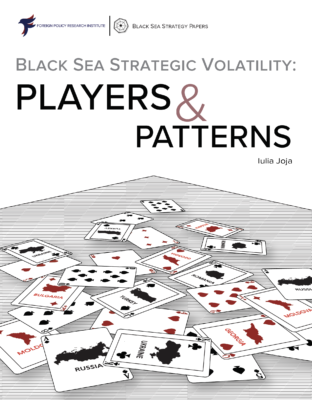A nation must think before it acts.
Download Black Sea Strategic Volatility: Players and Patterns
The Black Sea has been called “the inhospitable sea”[1] because of the “savage” tribes living on its shores. Today, the region is inhospitable for Western countries as they struggle to provide security in the region. The primary cause of this insecurity is the Russian Federation. Moscow has been the primary source and perpetrator of conflicts in the region, occupying territories of neighboring countries, as it did in Transnistria (Republic of Moldova) in 1991, South Ossetia and Abkhazia in 2008 (Georgia), and Crimea and the Donbas in 2014 (Ukraine).[2] Russia has used these territorial conquests to strengthen its military presence in the Black Sea and try to establish itself as a regional hegemon. Today, Russia uses its enhanced Black Sea capabilities not only to destabilize the region militarily, politically, and economically, but also to move borders, acquire territory, and project power into the Mediterranean. Thus, the Black Sea has become the theater for 19th century-style warfare, such as imperial expansion and land grabs.
It is easiest to understand Black Sea insecurity in comparison to the Baltic Sea, where littoral states share a heightened threat perception of Russia. While not all countries on the Baltic Sea, namely the Kingdom of Sweden and the Republic of Finland, are members of the North Atlantic Treaty Organization (NATO), they nevertheless have robust regional cooperation. As a result, Baltic Sea states have succeeded in addressing the growing threat of Russia’s military buildup in Kaliningrad, where the Kremlin has invested in Anti Access/Area Denial (A2/AD) capabilities to deny adversaries access or to hinder freedom of maneuver.[3] However, increased scrutiny of Russian military developments in the Baltic Sea serves Moscow’s purposes by directing Western attention away from the Black Sea—where countries are threatened and even invaded by Russia.[4]
Despite this situation, in the Black Sea, even NATO members cannot agree on a security policy. Romania has declared the “Westernization” of the Black Sea—via NATO or other Western institutions—a security priority for over a decade.[5] But the Republic of Bulgaria wants to keep Russian “peace and love” in the region.[6] Both Bulgaria and Republic of Turkey often side with Russia, though they are members of the NATO Alliance. Bucharest is joined by Georgia and Ukraine, which rejected their accommodating approach to Moscow after they were invaded. Now, both Georgia and Ukraine are at war with Russia on their own territory, whether in Ukraine’s Donbas or Georgia’s Abkhazia and South Ossetia regions. Both Tbilisi and Kyiv are modernizing their militaries to boost their defenses—in an effort to increase their chances of joining NATO and to keep the West involved. They perceive cooperation with NATO as their path to joining the Western bloc, as the European Union is militarily absent from the region.
Beyond the conventional threat of Russian aggression and military expansion, Black Sea countries face two other threats: disinformation and corruption. Russia plays a hand in both. Through disinformation and control over media assets, the Kremlin has built a complex narrative of traditional values that feeds the conservative-leaning public in Black Sea countries and beyond.[7] This has been so successful that even traditionally Russophobic publics, such as in Romania, have started doubting Western values and are leaning towards the East.[8] Russian meddling also exacerbates oligarchic state capture and corruption within the region. Oligarchs in Black Sea countries have siphoned off domestic and foreign funding—from the EU and International Monetary Fund (IMF), for instance—intended to develop agriculture, industry, and infrastructure.[9] This corruption fuels divisions between the rich and the poor and similarly sheds doubt on Western-backed democratization efforts.[10] Thus, the Black Sea’s wars—against the Russian military, disinformation, and corruption—cannot be separated from one another.
Nevertheless, Black Sea states have failed to devise a coherent strategy toward Russia. On paper, three of six littoral states are NATO members and two are NATO partners, eager to join the Alliance. In practice, however, Russia’s “divide and conquer” policy has been so successful that the Black Sea is a major source of insecurity. Black Sea states agree on one thing: they want the region to develop and prosper, but their policies often divide the region.





